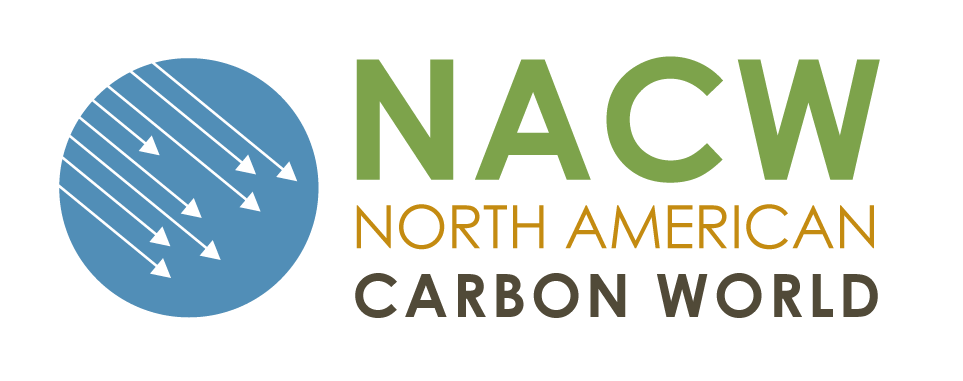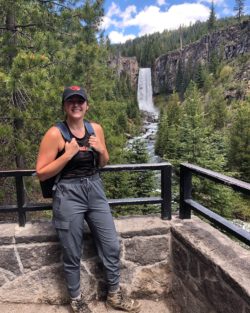1. What drives your environmental work and activism?
I originally became interested in environmental work in high school when I took a weather and climate course and learned about how ice cores can inform us about past climates. Since then, it has grown into a passion for learning and informing others about how climate change and fossil fuels impact environmental justice. Unfortunately, other issues tend to garner more attention by politicians and the media, so I’ve wanted to play a more active role in environmental policy. So, I shifted from chemistry to policy where I can use my expertise in both to bridge the gap between science and policy. This gives me a unique perspective on environmental work and activism.
2. What is one of your most exciting and rewarding achievements?
My most exciting achievement thus far was getting my Master of Public Policy from Oregon State University in June 2021. It was really interesting to see how the analytical and critical thinking skills I gained in my chemistry degree can translate into other areas of academics.
3. Who is your hero (or someone you admire greatly)?
I really admire Wangari Maathai – a Kenyan social, environmental, and political activist. She founded the Green Belt Movement – which focuses on environmental conservation, women’s rights, and planting trees – was a member of the Parliament of Kenya, and won the 2004 Nobel Peace Prize. While I was impressed with her resume, reading her memoir gave me a deeper understanding and appreciation for her and her legacy.
4. What are your favorite and frequently visited websites?
I enjoy reading articles from Scientific American because some of the articles incorporate more technical science into their stories – which I enjoy coming from a scientific background. They are published by Springer, which is a trusted research publisher that I would turn to during my graduate and undergraduate work as well. I also enjoy articles by Pew Research Center, as they publish their research with graphics and easy to interpret language.
5. What is a tip you’d like to share for leading a more sustainable life?
I would suggest starting small (e.g., walking, limiting plastic) and building up from there (e.g., limiting meat consumption, electric vehicles). Also, make sure to vote sustainability by supporting politicians that make climate change an important component of their platform.
6. Do you have a personal story that ties in with one of the Reserve’s protocol sectors?
During my undergrad, I was a member of the Student Office of Sustainability – a commission of Student Senate. One thing we worked on a lot was educating the student body on how to recycle and compost correctly, mainly focusing on campus specific waste (i.e., the food/drink waste from our student center). During our waste studies (determining how well the students are sorting the waste) we found that there was a lot of wishful composting and recycling. To combat this, we added pictures to the top of the waste receptacles, did presentations before classes, and taught students how to sort while they approached the bins.
7. What is your opinion on the progress of climate policy and carbon markets (any level, intl, federal, state etc)?
I think the progress of climate policy and carbon markets at all levels are too slow. With that being said, I do acknowledge the complexity of international agreements when it comes to addressing an issue that impacts everyone, yet while respecting autonomy. The partisanship and bureaucratic nature of the federal government has made it very difficult to mitigate climate change and implement meaningful policies at the scale and pace that is necessary. As a result, I believe state governments should be the ones to act as leaders in the meantime – which can serve as a template for future federal policies.
8. If you could spend one week in a natural area in the U.S., where would it be?
Ever since I watched the Chasing Ice documentary, I’ve always wanted to go to the Artic and see ice shelves.
9. What is an environmental book that you think should be required reading in schools?
I think every environmentalist should read “Unbowed: A Memoir” by Wangari Maathai because it touches on the interconnections between science, environmental policy, and social justice. In this book she recounts her experiences growing up in rural Kenya and how it shaped her as a person and as an activist. She challenged the status quo so much so that her husband divorced her, she was arrested, and the Kenyan President called her out publicly countless times.
10. What is your favorite meal?
I love seafood pasta with garlic bread!
11. What is something about you that your professional peers would be surprised to learn?
I was surprised to learn that Craig is a Vikings fan. As a Packers fan myself, I’m pretty disappointed, but I’m looking forward to our in-office rivalry.
12. What emerging opportunities in climate / carbon excite you the most?
I read recently that in Europe that bankers will have to prove that they are contributing to a cleaner environment, or they will receive a smaller pay package. While sustainability may be difficult to quantify, their attempt to “redefine capitalism” is very interesting and I am looking forward to seeing how this unfolds.
13. What are some of your favorite books/movies/tv shows/podcasts etc?
For politics and current events, I listen to “The Daily” by The New York Times and to “Pod Save America”. I just finished “I Am Not a Monster” podcast, which talks about how a woman got involved with ISIS and moved to Syria with her young children, and “Circus”, which talks about the #FreeBrittany movement! For TV, I love reality tv like The Real Housewives, Love Island, and Hell’s Kitchen.
14. What are some of your favorite weekend activities?
While living in Oregon, I’ve really enjoyed hiking on the weekends, especially something with a great view!






Comments are closed here.